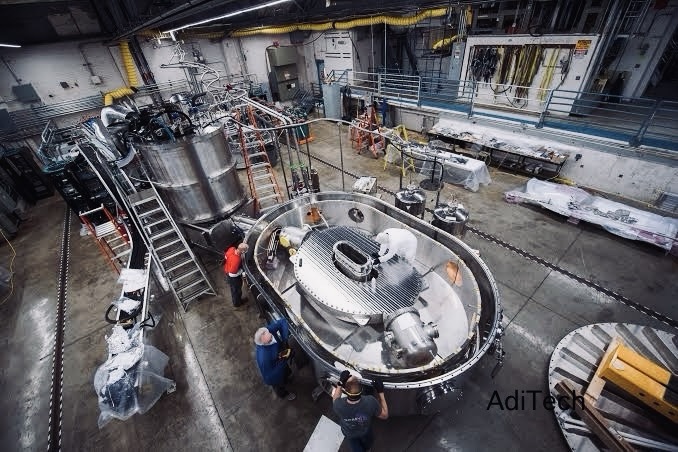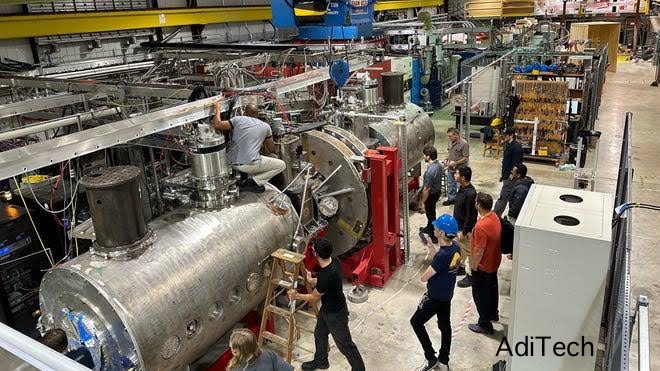Google has made a commitment to buy 200 megawatts of electricity from a fusion energy company. Whilst the fusion energy is yet to be produced. My findings about this act is, it is known as a “power purchase agreement” (PPA). To be surprised is not wrong. More specifically, the act is a conditional or forward looking PPA. It’s not about buying power now per say. It has to do with securing access to it, if and when it becomes available.
Why would Google do this?
From my findings, i would say to
1. To Support breakthrough in Energy Technology. Fusion energy is the same process that powers the sun. It has long been seen as the major path to clean energy. There are no emissions or long term waste. It also has virtually unlimited fuel. But it’s incredibly hard to pull off. Google’s deal is a way of backing a company it believes can make it work. The company Commonwealth Fusion. Is a fusion startup Google has been involved with for years. I’m guessing this deal is expansion of more deals between this two companies.
2. Some times to Send a signal. This deal is a powerful signal to investors, and the market. I believe the tech is real and the idea is worth betting on. I mean that can help unlock further funding, speed up development, and boost the major investor’s confidence.
I see this as Google trying to Secure clean energy supply for the future.
Google has pledged to run all of its data centers and operations on 24/7 carbon free energy by 2030. With this fusion energy investment with common wealth, i guess they are on track this pledge already. Buying fusion energy early helps prepare for that goal and locking into future clean power at a good price.
Although i’ve researched. Even used my Nordvpn to access Chatgpt just to find that fusion doesn’t yet exist commercially!
As of this 2nd day of July 2025, no one has yet built a commercially viable fusion power plant. But some companies (like TAE, Helion, Commonwealth Fusion Systems, etc.) are aiming for demonstration plants.
So i guess for google and any other individual investor, this is a bet on your sight for the future. Just like what happened with Tesla. People got preorders for a car before it existed. Word came out sighting how SpaceX sold launches before their rockets were proven to work. In this case, Google is saying we are on board. We will be your first customer now make it happen.
To conclude, after all research and findings
The Google’s 200 MW fusion deal is not about energy delivery today. Clearly it’s a strategic investment move. Plus their commitment to help kickstart the fusion energy industry. The investment is meant to boosts the fusion company confidence and credibility. This move helps bring Google closer to its clean energy goals.
If fusion works, this could go down as a turning point in the history of both energy and technology innovation. If it doesn’t work out as planned, Google knows how much of a calculated risk it would have taken. Although it would still have helped push innovation forward.
There’s a downside for Google in committing to invest in this innovation. I mean, it doesn’t exist yet. Imagine the financial risk, reputational exposure, and the uncertainty. Although the idea is worth it all put together.

Here’s a little breakdown of the major risks Google might encounter
1. The fact that the Technology may Not Work:
Knowing that the Fusion energy Technology is still in its experimental stage. No one has actually built a fusion plant that can generate more energy than it consumes. Building such a plant commercially is still a distant achievement. If the fusion company fails to deliver, Google gets nothing, despite the hype. Talk about investments and hype.
I wrote this article about Spotting smart Investment portfolios, Not the Hyped. This is a typical example, showcasing Google’s portfolio investment in fusion energy without hype.
Worst case?, Google may have spent this amount of resources securing a deal that never materializes.
I mean if you ask me as an investor i would say it was worth the risk and effort. I hope i’m there when this comes to light. Cause even in moderate failure, delays could push the manufacturing of fusion years beyond Google’s 2030 carbon free energy target. What would this have amounted to for Google?
Money Tied Up or Wasted? I believe its resources put to good use. knowing that Google will have to invest in grid infrastructure, planning, or regulatory processes for power that might never arrive. Any premium price they agree to might be higher than future alternatives (like cheaper solar, nuclear, or battery tech).
2. Defamatory Risk
Google is positioning itself as a climate leader. Just incase it’s plot for the future of fusion fails or becomes a scam. Hoping there’s no collapses in scandal, or cause for massively delay. Still, if it appears that way, some might think Google is too gullible. Others might see it as chasing hype. Like the development of AdiTech which is a risk coming slowly.

But Like i said google is positioning itself for the future and so is AdT.
3. Misleading stakeholders or overpromising carbon free progress
You could call it that or simply an investment gone bad. Although confirming by following up to see google’s effort would be something i intend doing. And hopefully will be posting on AdiTech when ever there’s development on this.
There will be comments about Google just Building competition. Instead of Backing Vaporware and other real life available renewable energies like solar, wind, or geothermal.
We have to consider the Opportunity Cost in this
This is future technology. Google is a multinational business. What’s to stop them from also backing Vaporware? They could also invest in real life renewable energies like solar, wind, or geothermal. By committing to a future fusion source, Google might limit its flexibility. Especially in adopting a better more cost effective technology that emerges in the meantime. Imagine a major breakthrough in advanced fission or next gen batteries. Share your thoughts!.
Discover more from AdiTech
Subscribe to get the latest posts sent to your email.
